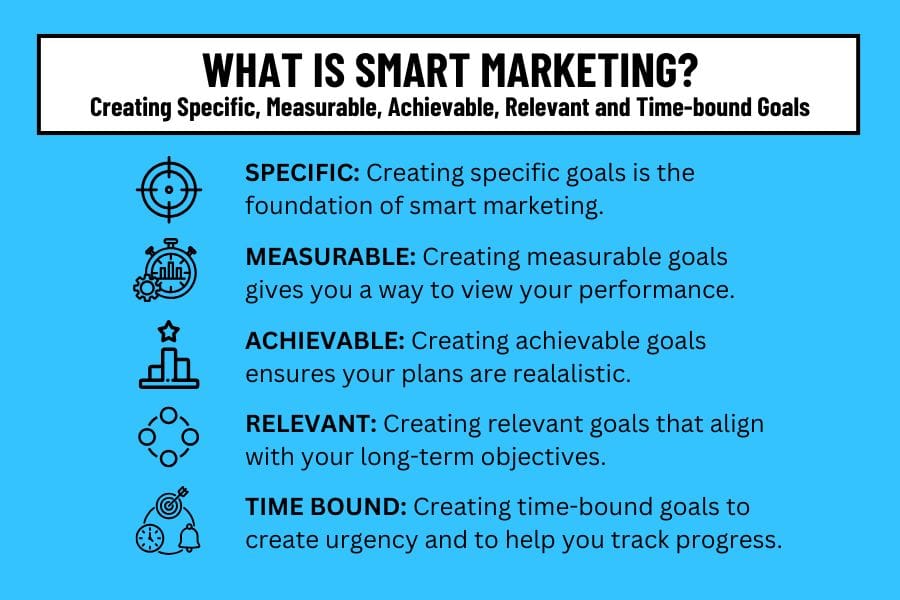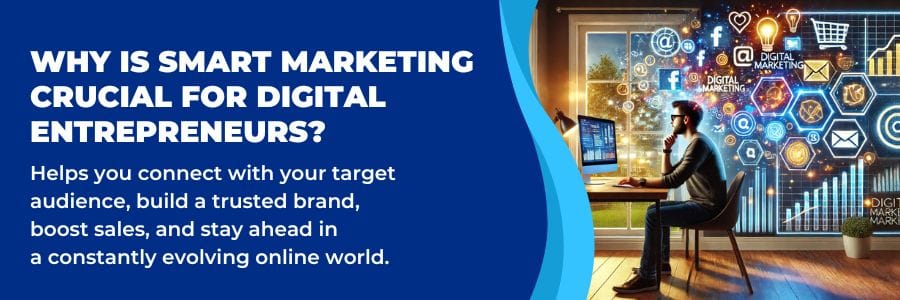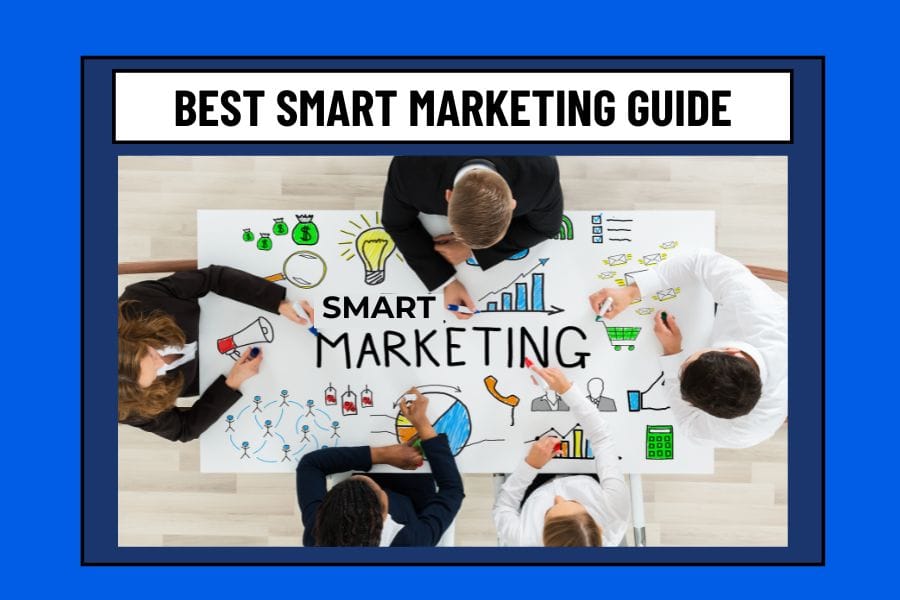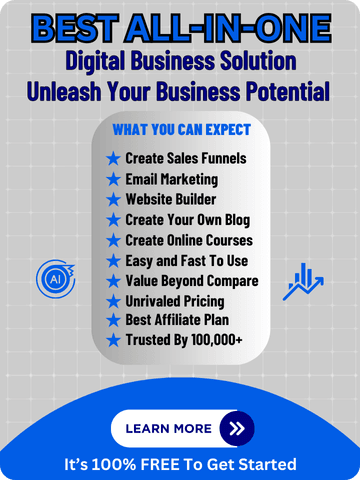Master smart marketing with our ultimate guide for digital entrepreneurs! Learn actionable strategies to grow your business and stay ahead in the digital landscape.
Introduction
Are you ready to transform your digital business with strategies that actually work? As a digital entrepreneur, you know the challenges of navigating an ever-changing online landscape. Staying competitive, building an authentic online presence, and generating a steady income can feel overwhelming. That’s where smart marketing comes in—a strategic approach that helps you create specific, measurable, achievable, relevant, and time-bound (SMART) goals to drive growth and success. This guide is tailored to equip you with the tools and insights you need to not only survive but thrive in the digital space.
In this comprehensive post, you’ll discover the best practices for implementing smart marketing into your business strategy. We’ll cover everything from setting SMART goals to leveraging AI for efficiency, exploring actionable strategies like SEO, email marketing, and social media engagement. You’ll also learn how to overcome common marketing challenges, such as maintaining authenticity and navigating advanced tools like machine learning. By the end, you’ll have a clear roadmap to elevate your marketing efforts and achieve lasting success. Ready to dive in? Let’s get started!
What is Smart Marketing?

Smart marketing is more than just a buzzword—it’s a practical framework designed to help you, as a digital entrepreneur, create clear, actionable goals that drive measurable success. By applying the SMART criteria (Specific, Measurable, Achievable, Relevant, and Time-Bound) to your marketing efforts, you can effectively design strategies that align with your business objectives and help you grow with confidence. Let’s break down each element of this powerful framework to show you how to apply it in your business.
Specific
Setting specific goals is the foundation of smart marketing. Instead of vague aspirations like “increase sales,” focus on well-defined objectives like “grow e-commerce revenue by 20% within six months by launching a new product line.” The more precise your goals, the easier it will be to align your efforts and resources, ensuring every step you take drives your business forward. Specificity eliminates guesswork and gives you a strategic roadmap to success.
Measurable
A smart digital marketing plan thrives on measurable benchmarks. Without clear metrics, it’s impossible to know whether your campaigns are working. Define quantifiable key performance indicators (KPIs) such as website traffic, conversion rates, or email open rates. For example, track metrics like “boost monthly website visits by 15%” to validate progress and make data-driven decisions. Measurable goals give you a transparent view of your performance and the confidence to adapt when needed.
Achievable
While ambition is vital, setting achievable goals ensures your plans remain grounded in reality. Assess your current capabilities, resources, and timelines when crafting objectives. For instance, instead of targeting a million social media followers overnight, aim to grow your audience by 10% over the next quarter. Realistic yet challenging goals keep you motivated while preventing burnout and frustration.
Relevant
Relevance is the bridge between your marketing efforts and your broader business vision. Ensure your goals are relevant by aligning them with your long-term objectives. For instance, if your aim is to establish thought leadership in your niche, focus on strategies like creating high-quality content or hosting webinars rather than chasing unrelated trends. Relevance keeps your marketing aligned with your strategic roadmap and ensures your efforts deliver meaningful results.
Time-Bound
Every goal in your smart marketing framework needs a timeline to maintain focus and momentum. Without time constraints, even the most specific and measurable objectives can drift into procrastination. Set clear deadlines like “launch the email campaign within 30 days” or “double customer retention by year-end.” Time-bound milestones create urgency and help you track progress effectively while keeping your team accountable.
By mastering these five SMART objectives, you’re laying the groundwork for marketing strategies that drive tangible results. Next, let’s explore why smart marketing is essential for digital entrepreneurs and how it empowers you to stay ahead in today’s competitive landscape.
Why is Smart Marketing Crucial for Digital Entrepreneurs?

In today’s fast-paced digital landscape, staying competitive is a constant challenge. For digital entrepreneurs like you, smart marketing is the key to success. It helps you connect with your target audience, build a trusted brand, boost sales, and stay ahead in a constantly evolving online world. Let’s explore the critical reasons why adopting this strategic approach can make all the difference in your entrepreneurial journey.
Targeted Reach and Engagement
One of the most powerful benefits of smart marketing is the ability to identify and connect with your ideal audience. By understanding their needs, preferences, and online behaviors, you can craft messages and content that truly resonate. Whether through social media, search engine optimization (SEO), or content marketing, smart strategies allow you to meet your audience where they spend their time online. With a mix of organic tactics and paid advertising, you can achieve both wide reach and meaningful engagement, ensuring your marketing efforts are both efficient and impactful.
Brand Building and Customer Loyalty
Your brand is your business’s heartbeat, and smart marketing helps it thrive. By consistently delivering valuable content and engaging authentically, you create a strong online identity that fosters trust. Over time, this trust builds loyalty, turning first-time customers into repeat buyers. Strong brand recognition doesn’t just attract new customers—it retains the ones you already have, multiplying the impact of your efforts. For digital entrepreneurs, cultivating a loyal audience is a cornerstone of sustainable growth.
Measurable Results and Optimization
Data-driven decision-making is at the core of smart marketing. By setting measurable goals and tracking your campaigns, you gain actionable insights into what’s working and what needs improvement. From monitoring email open rates to analyzing website traffic, this feedback loop allows you to refine your strategies and optimize your ROI. The ability to adapt quickly ensures that every dollar spent on marketing is directed toward generating tangible results, empowering you to scale your efforts effectively.
Staying Ahead of the Competition
The digital landscape is dynamic, with trends and technologies evolving at lightning speed. Smart marketing keeps you one step ahead by encouraging adaptability. By staying informed about emerging tools and techniques, you can leverage cutting-edge strategies to differentiate your business. Understanding your competitors and market trends also allows you to identify gaps in the market, positioning your brand as a leader rather than a follower.
By integrating smart marketing into your strategy, you’re setting the stage for long-term success. Next, we’ll explore actionable examples of smart marketing strategies and goals that can help you achieve your business objectives. Let’s dive into the details!
Examples of Smart Marketing Strategies and Goals for Digital Entrepreneurs

Here are more detailed insights into each strategy, designed to help you achieve your smart marketing goals with actionable steps and practical approaches.
Brand Building
Strategy: Building a strong brand requires consistent messaging, visual identity, and customer interactions that resonate with your audience. This includes crafting a memorable logo, developing a unique voice, and sharing stories that connect with your target market. Focusing on brand-building initiatives like social proof, testimonials, and community engagement will help you stand out in a crowded marketplace.
SMART Goal: Increase customer retention rate by 10% within the next year by implementing a loyalty program and offering personalized customer service.
Content Marketing
Strategy: Content marketing is all about delivering value through content that informs, entertains, or solves problems for your audience. This can include blog posts, videos, podcasts, or infographics tailored to your audience’s needs. By staying consistent with your content schedule and focusing on SEO, you can boost your organic reach and position yourself as a thought leader in your niche.
SMART Goal: Increase organic website traffic by 20% within six months by creating high-quality content optimized for relevant keywords.
Search Engine Optimization (SEO)
Strategy: SEO focuses on improving your visibility on search engines, ensuring your website is optimized for both users and algorithms. This involves conducting keyword research, optimizing meta tags and headers, and building backlinks to strengthen your domain authority. Regularly updating content and focusing on user experience will help you climb the search rankings and attract more visitors.
SMART Goal: Improve website ranking for target keywords by 10 positions on Google within three months.
Social Media Marketing
Strategy: Social media marketing leverages platforms like Facebook, Instagram, Twitter, and LinkedIn to reach and engage with your audience. By sharing compelling visuals, stories, and updates, you can build a community around your brand. Scheduling regular posts, engaging in conversations, and using analytics to understand what resonates can significantly enhance your presence.
SMART Goal: Increase social media engagement (likes, comments, shares) by 25% within the next quarter by posting high-quality content and running targeted ads.
Email Marketing
Strategy: Email marketing is a direct line of communication with your audience, allowing you to deliver personalized offers, updates, and educational content. Building a segmented email list ensures you send the right message to the right people, increasing engagement. Regularly testing subject lines, visuals, and call-to-action buttons can further optimize performance.
SMART Goal: Increase email open rates by 10% within the next month by sending personalized emails and optimizing subject lines.
Paid Advertising
Strategy: Paid advertising helps you reach a larger audience quickly through platforms like Google Ads, Facebook Ads, and YouTube Ads. By targeting specific demographics and interests, you can ensure your ads reach the people most likely to engage with your brand. Using retargeting strategies and monitoring ad performance will help you get the best return on your investment.
SMART Goal: Increase website traffic by 15% within the next quarter by running targeted paid advertising campaigns on relevant platforms.
Influencer Marketing
Strategy: Influencer marketing involves partnering with individuals who have a strong online presence and can advocate for your brand. Collaborating with influencers in your niche can introduce your products to a highly engaged audience. Focus on building authentic relationships with influencers and ensuring their audience aligns with your target market for maximum impact.
SMART Goal: Increase brand awareness by 10% within the next six months by partnering with 3 niche influencers.
Affiliate Marketing
Strategy: Affiliate marketing allows you to collaborate with affiliates who promote your products or services in exchange for a commission. This strategy expands your reach by leveraging your affiliates’ audiences. Providing affiliates with the right tools, such as banners and promo codes, ensures they have everything they need to succeed.
SMART Goal: Increase sales by 5% within the next quarter by partnering with 2 relevant affiliate programs.
Marketing Costs
Strategy: Utilizing AI-powered tools for marketing automation can significantly reduce costs and improve efficiency. Tools like chatbots, automated email responders, and scheduling apps free up your time and budget for other priorities. AI can also streamline processes like ad optimization and data analysis, helping you maximize ROI.
SMART Goal: Cut marketing costs by 15% within the next year by adopting AI-driven tools for automation.
Customer Relationship Management (CRM)
Strategy: A CRM system enables you to manage customer interactions, track engagement, and personalize marketing efforts. Segmenting your audience based on behaviors and preferences helps you send tailored messages that build stronger connections. Investing in a CRM not only improves customer retention but also enhances your ability to nurture leads.
SMART Goal: Improve customer retention by 5% within the next year by implementing segmented email campaigns and personalized outreach.
By diving deeper into these strategies, you can confidently implement smart marketing techniques that align with your business objectives. Next, we’ll explore how AI can take these strategies to the next level, streamlining your efforts and driving even better results. Stay tuned!
How to Leverage AI in Smart Marketing?

Incorporating AI into your smart marketing strategy can revolutionize the way you connect with your audience, optimize your campaigns, and boost your revenue. By automating tasks, gaining deeper insights, and enhancing customer experiences, AI empowers digital entrepreneurs to stay ahead in the competitive online landscape. Let’s explore how you can leverage AI across various aspects of your marketing efforts to maximize efficiency and impact.
Personalization and Customer Segmentation
AI enables you to deliver hyper-personalized experiences by analyzing customer data such as purchase history, browsing behavior, and demographics. It can recommend products tailored to individual preferences, craft targeted email campaigns, and even customize website content. These highly personalized interactions not only improve customer satisfaction but also drive conversions and loyalty.
Content Creation and Optimization
AI tools can generate a wide range of content, from blog posts and social media captions to marketing copy and video scripts. Platforms like Jasper and ChatGPT can assist in creating engaging, SEO-optimized content in minutes. This frees up your time to focus on creativity and strategic planning, ensuring your content resonates with your target audience.
Automation and Efficiency
AI simplifies repetitive tasks such as email scheduling, social media posting, and lead qualification, enabling you to focus on high-level strategies. Tools like Zapier and HubSpot integrate automation into your workflows, reducing manual effort and enhancing efficiency across all marketing operations.
Data Analysis and Insights
AI algorithms excel at processing vast datasets to uncover patterns, trends, and customer preferences. These insights help you make informed decisions about campaign performance, customer behavior, and market opportunities, allowing you to refine your strategies for maximum effectiveness.
Predictive Analytics
With AI-powered predictive analytics, you can forecast customer behavior, spot potential risks, and anticipate emerging trends. This enables you to proactively adjust your marketing approach, ensuring your strategies remain relevant and impactful in a rapidly evolving digital landscape.
Customer Service and Engagement
AI-powered chatbots like ChatGPT, Drift, Alexa and many others can handle customer inquiries, provide real-time support, guide prospects through your sales funnel and ultimately improve the user experience. This not only enhances the customer experience but also alleviates pressure on your human support team, allowing them to focus on complex tasks.
Search Engine Optimization (SEO)
AI tools like Surfer SEO and SEMrush can optimize your content for search engines by analyzing keywords, suggesting improvements, and monitoring website rankings. These insights help you drive more organic traffic to your site and improve your online visibility.
Lead Generation and Nurturing
AI helps identify potential leads by analyzing customer behavior and segmenting them based on their needs and interests. It then nurtures these leads with personalized content and offers, moving them seamlessly through the sales funnel and increasing your conversion rates.
Email Marketing
AI takes email marketing to the next level by segmenting your email lists, personalizing email content, and automating campaign scheduling. Tools like Mailchimp and Klaviyo can send behavior-based triggers, ensuring your messages reach the right audience at the right time.
Social Media Management
AI streamlines your social media strategy by scheduling posts, analyzing engagement metrics, and identifying trending topics. Platforms like Buffer and Hootsuite leverage AI to optimize posting times and content performance, maximizing your impact on social channels.
Paid Advertising
AI-powered tools like Google Ads Smart Bidding and Facebook’s machine learning algorithms automate ad buying, optimize ad targeting, and personalize ad creative. This ensures your campaigns reach the right audience while minimizing costs and maximizing ROI.
By integrating AI into your smart marketing framework, you can elevate your campaigns, reduce manual workloads, and achieve more with less effort. Up next, we’ll discuss the best digital marketing tools including categories and some popular options. Let’s prepare for success!
Best Tools for Smart Marketing

Every digital entrepreneur needs the right marketing tools to succeed, but navigating the vast number of options can be overwhelming. You don’t need every tool when starting out. Instead, consider your specific needs and, if simplicity is your priority, opt for an all-in-one platform to streamline your efforts. Below are key marketing tool categories and some of the most popular tools within each.
Website Builders
Website builders are essential for creating a professional online presence without needing coding expertise. Popular tools include:
- WordPress: A versatile platform offering extensive customization with thousands of themes and plugins.
- Wix: A beginner-friendly builder with a drag-and-drop interface and design flexibility.
- Squarespace: Known for its sleek, modern templates tailored for creatives and businesses.
- Shopify: Ideal for e-commerce businesses with robust features for online stores.
- Weebly: A simple platform for small businesses, featuring integrated SEO and e-commerce tools.
Landing Page Builders
Landing page builders help you create pages optimized for conversions, whether for lead generation or sales. Popular tools include:
- Unbounce: A top choice for designing and testing high-converting landing pages.
- Instapage: Offers advanced personalization features and A/B testing capabilities.
- Leadpages: Known for affordability and ease of use, perfect for small businesses.
- ClickFunnels: Known for it’s funnel-building capabilities and landing page creation.
- GetResponse: Includes landing page tools as part of its email marketing suite.
Funnel Builders
Funnel builders guide users through a structured journey to achieve specific goals, such as making a purchase. Popular tools include:
- ClickFunnels: One of the most popular platforms for building and managing funnels.
- GrooveFunnels: An all-in-one platform offering a suite of funnel-building tools.
- Kartra: Provides complete marketing automation alongside funnel creation.
- Builderall: Affordable and packed with tools for funnels and marketing campaigns.
- Systeme.io: A cost-effective solution that integrates funnel-building with other marketing tools.
Content Marketing Tools
Content marketing tools help you plan, create, and distribute engaging content. Popular tools include:
- HubSpot: Offers a content management system and tools for analytics and optimization.
- CoSchedule: Simplifies content planning with a robust editorial calendar.
- BuzzSumo: Helps identify trending topics and track content performance.
- Grammarly: Ensures your content is polished and error-free.
- Jasper (formerly Jarvis): AI-powered content creation to generate high-quality copy quickly.
Social Media Marketing Tools
Social media tools enable you to manage and grow your presence across platforms. Popular tools include:
- Hootsuite: Comprehensive social media management for scheduling and analytics.
- Buffer: Simplifies post scheduling and performance tracking.
- Sprout Social: Offers social listening and advanced analytics.
- Canva: Ideal for designing eye-catching visuals for social media posts.
- Later: Tailored for Instagram, with features like grid planning and analytics.
Graphic Design Tools
Graphic design tools are vital for creating professional visuals that capture attention. Popular tools include:
- Canva: Intuitive drag-and-drop design with templates for all skill levels.
- Adobe Photoshop: A professional-grade tool for advanced image editing.
- Adobe Illustrator: Ideal for creating vector graphics and logos.
- Figma: Great for collaborative design and prototyping.
- Piktochart: Focused on creating infographics and presentations.
Search Engine Optimization (SEO) Tools
SEO tools improve your website’s visibility and organic traffic. Popular tools include:
- Ahrefs: Comprehensive keyword research, backlink analysis, and competitor insights.
- SEMrush: A versatile platform for keyword tracking and SEO audits.
- Moz Pro: Known for its user-friendly interface and excellent keyword explorer.
- RankMath: A WordPress SEO plugin that simplifies optimizing your content by providing built-in suggestions aligned with industry best practices.
- Yoast SEO: A WordPress plugin to optimize on-page SEO.
- Google Search Console: Free and essential for monitoring website performance in search results.
Email Marketing Tools
Email marketing tools allow you to nurture leads and drive sales through personalized campaigns. Popular tools include:
- Mailchimp: A beginner-friendly platform with robust automation features.
- Constant Contact: Ideal for small businesses with an intuitive interface.
- Klaviyo: Focused on e-commerce email marketing with advanced segmentation.
- ActiveCampaign: Combines email automation with CRM features.
- ConvertKit: Tailored for creators and bloggers looking to grow their audience.
Paid Advertising Tools
Paid advertising tools help you run and manage effective ad campaigns. Popular tools include:
- Google Ads: The go-to platform for search engine and display advertising.
- Facebook Ads Manager: Advanced tools for creating and managing social media ads.
- LinkedIn Ads: Ideal for B2B businesses targeting professional audiences.
- AdEspresso: Simplifies the process of creating and optimizing ads on Facebook and Google.
- Microsoft Advertising: An often-overlooked but powerful alternative to Google Ads.
Analytics Tools
Analytics tools provide insights into your marketing performance. Popular tools include:
- Google Analytics: Essential for tracking website traffic and user behavior.
- Hotjar: Visualizes user interactions with heatmaps and session recordings.
- Mixpanel: Focuses on tracking user engagement across digital products.
- Kissmetrics: Offers in-depth customer behavior analytics for conversions.
- Crazy Egg: Simplifies website optimization with visual insights.
Conversion Optimization Tools
Conversion optimization tools help you maximize the effectiveness of your website and campaigns. Popular tools include:
- Optimizely: A/B testing and personalization tools for improving conversion rates.
- Unbounce: Focused on creating and optimizing landing pages.
- VWO: A robust platform for testing and optimizing user experiences.
- Crazy Egg: Visual tools to analyze and optimize conversion pathways.
- HubSpot: Includes conversion-focused features like forms and lead generation.
Marketing Automation Tools
Marketing automation tools simplify repetitive tasks and enhance efficiency. Popular tools include:
- HubSpot: Offers automation for email, social media, and CRM workflows.
- ActiveCampaign: Combines automation with advanced email marketing features.
- Marketo: Focused on B2B marketing with advanced automation tools.
- Pardot: Salesforce’s solution for automating marketing campaigns.
- Systeme.io: Combines marketing automation with tools for funnels and email.
CRM Tools
Customer Relationship Management (CRM) tools help you track and manage interactions with your customers. Popular tools include:
- Salesforce: A leading CRM platform with extensive features for businesses of all sizes.
- HubSpot CRM: Free and intuitive, perfect for small businesses.
- Zoho CRM: Affordable with a suite of integrations.
- Pipedrive: A sales-focused CRM designed for small teams.
- Freshsales: Includes AI-powered insights and automation for lead management.
AI Tools for Marketing
AI-powered tools enhance creativity, personalization, and data analysis. Popular tools include:
- Jasper AI: Generates high-quality content quickly and efficiently.
- ChatGPT: Perfect for creating engaging copy, chatbot scripts, and more.
- Surfer SEO: Combines AI with SEO optimization.
- Adzooma: Automates and optimizes ad campaigns across multiple platforms.
- Crystal: Analyzes customer communication styles to enhance personalization.
All-in-One Platforms
All-in-one platforms provide comprehensive solutions for managing all aspects of marketing. Popular tools include:
- Systeme.io: to streamline your efforts, consider using Systeme an all-in-one marketing platform designed to help you launch and grow your business seamlessly. With all the tools you need in one place to build and manage websites, sales funnels, Email marketing, online courses, affiliate programs, membership sites, webinars, contact management, payment processing and more. Try the FREE option, more tools included than many competitors offer in their paid starter plans.
- HubSpot: a great all-in-one CRM platform that excels in customer relationship management, sales management, marketing, and analyzing performance. It’s designed to drive growth by prioritizing customer needs.
- GrooveFunnels: an all-in-one platform Groovefunnels is specifically designed for digital markers that simplifies building and managing your online business. It offers tools for creating sales funnels, websites, landing pages, and selling products, streamlining your marketing and sales efforts.
With the right tools, you can streamline your smart marketing strategy and grow your digital business effectively. Up next, let’s explore some common challenges digital entrepreneurs face when implementing smart marketing strategies—and how to overcome them. Stay tuned!
Smart Marketing Challenges

Implementing smart marketing can revolutionize your digital business, but it’s not without its challenges. As a digital entrepreneur, you’ll encounter obstacles ranging from navigating cutting-edge technologies to maintaining authenticity in your brand voice. Let’s take a closer look at some of the most pressing challenges and how to address them.
Navigating AI & Machine Learning (ML)
Integrating AI and ML into your smart marketing strategies brings its own set of hurdles. Ethical considerations such as ensuring data privacy and maintaining user trust are paramount. Customers are increasingly concerned about how their data is collected and used, so adhering to transparent practices and compliance with regulations like GDPR is crucial. Additionally, the complexity of AI systems can make it challenging to explain their processes to your audience, creating a potential barrier to trust. Focusing on clear communication about AI use and investing in secure, ethical data practices can help overcome these challenges.
Delivering Personalized Experiences at Scale
Hyper-personalization is at the heart of smart marketing, but scaling it effectively is no easy feat. Leveraging data-driven insights to map out customer journeys requires sophisticated tools and a deep understanding of your audience’s preferences. The challenge lies in analyzing large datasets without losing sight of the human element in your marketing. Striking the right balance between automation and genuine customer engagement ensures your brand remains approachable while delivering tailored experiences.
Maintaining Authenticity and Building Trust
In the competitive digital business environment, maintaining authenticity is a cornerstone of building long-term customer relationships. Customers value transparency and sincerity, especially in content marketing and brand communication. However, the push for automated solutions and optimized campaigns can sometimes dilute your brand’s authenticity. Focus on creating meaningful, value-driven content and engaging with your audience personally to build trust. Transparency in your processes, such as how you handle data or select partnerships, further reinforces your credibility.
While these challenges may seem daunting, overcoming them will position your digital business for sustained success. In the next section, we’ll explore how you can put everything together and take actionable steps to move forward with your smart marketing strategy. Let’s keep building!
Ready to Get Started?
Recap and How to Move Forward
Throughout this guide, you’ve discovered the transformative power of smart marketing and how it equips digital entrepreneurs like you to navigate the challenges of the online business world. By setting SMART goals, leveraging AI, and employing actionable strategies across brand building, content marketing, SEO, and more, you can achieve measurable growth and stand out in today’s competitive digital landscape.
To move forward, focus on creating a customized smart marketing plan that aligns with your business goals. Begin by identifying your target audience, setting specific and measurable objectives. Balance a data-driven approach with authenticity and creativity to build trust and customer loyalty. Consistency is key—regularly assess your progress and adjust your strategies to stay on track toward achieving your smart goals. Consider starting with a free suite of tools like those offered by Systeme to simplify your efforts.
Interesting Fact: The Average Person Spends 7 Hours Daily Consuming Digital Content
Did you know that the average person spends approximately 7 hours a day consuming digital content? According to Similarweb, this massive level of engagement underscores the importance of creating compelling and relevant marketing campaigns. For digital entrepreneurs, this represents both an opportunity and a challenge: the opportunity to reach a vast audience and the challenge of standing out in an increasingly crowded digital space.
To meet this demand, your smart marketing strategy must focus on delivering high-quality, engaging content that captivates your audience. Whether it’s through blog posts, videos, or social media campaigns, every piece of content should resonate with your target audience and align with their needs and interests.
Ready to take the next step? Let’s make it happen! Try Systeme, the best digital business solution that’s 100% FREE to get started.
FAQs: Smart Marketing
What are the benefits of smart marketing?
Answer: Smart Marketing
Smart marketing offers a host of advantages for digital entrepreneurs aiming to grow their businesses. By setting specific, measurable, achievable, relevant, and time-bound (SMART) goals, you can create a clear roadmap to success. This approach ensures you stay focused, track progress effectively, and optimize strategies for maximum ROI. Smart marketing also helps you connect with your ideal audience, build a loyal customer base, and stay competitive in a rapidly changing online environment. With its emphasis on data-driven decisions, it empowers you to make informed choices that directly impact your bottom line.
What is smart digital marketing?
Answer: Smart Marketing
Smart digital marketing is the strategic application of the SMART framework to digital channels. It involves creating specific goals for online campaigns, such as improving website traffic or increasing conversions through tools like SEO, social media, and email marketing. By focusing on measurable outcomes and leveraging advanced analytics, smart digital marketing ensures your efforts are efficient and effective. This approach aligns your digital strategies with your overall business objectives, helping you reach the right audience while maximizing your resources.
What is smart individual marketing?
Answer: Smart Marketing
Smart individual marketing focuses on tailoring your strategies to meet the unique needs and preferences of specific individuals. By leveraging data insights, such as purchasing history and online behavior, you can create hyper-personalized marketing campaigns that resonate on a deeper level. This one-to-one approach ensures that your messaging feels relevant and personal, fostering stronger connections and driving higher engagement. Whether through personalized emails or custom product recommendations, smart individual marketing is a game-changer for customer retention and loyalty.
What is AI performance marketing?
Answer: Smart Marketing
AI performance marketing leverages artificial intelligence to enhance the efficiency and effectiveness of your marketing campaigns. AI tools analyze vast amounts of data in real time to optimize ad targeting, personalize customer interactions, and improve campaign performance. For example, platforms using AI performance marketing can predict the best times to launch campaigns, identify high-value customers, and automate repetitive tasks like bid adjustments. This approach not only saves time but also ensures you’re maximizing your marketing budget with precision.
What is online network marketing?
Answer: Smart Marketing
Online network marketing is a digital adaptation of the traditional multi-level marketing (MLM) model. It involves building a network of independent affiliates who promote and sell your products or services through online channels. This strategy utilizes tools like social media, email, and webinars to reach a broad audience. The digital format allows for greater scalability and access to real-time analytics, helping you track performance and optimize your network’s efforts. For digital entrepreneurs, online network marketing offers a cost-effective way to expand reach and generate income.
What is an all-in-one digital marketing platform?
Answer: Smart Marketing
An all-in-one digital marketing platform, often referred to as a digital marketing suite, combines multiple tools and functionalities into a single system to simplify your marketing efforts. These platforms, such as Systeme, provide features like email marketing, sales funnel creation, content management, and analytics, all under one roof. This streamlined approach eliminates the need for juggling multiple tools, saving time and reducing costs. With an all-in-one digital marketing platform, you can seamlessly manage and scale your marketing strategies, making it an invaluable asset for digital entrepreneurs looking to grow their businesses efficiently.
Attention Digital Entrepreneurs
Equipped with this guide about smart marketing, you are now better prepared to grow your business and stay ahead in the digital landscape. Your next step is choosing the right marketing tools to achieve your business goals. Discover how this digital marketing platform can transform your online business today!
It’s 100% FREE, learn more here: [All-In-One Solution]





